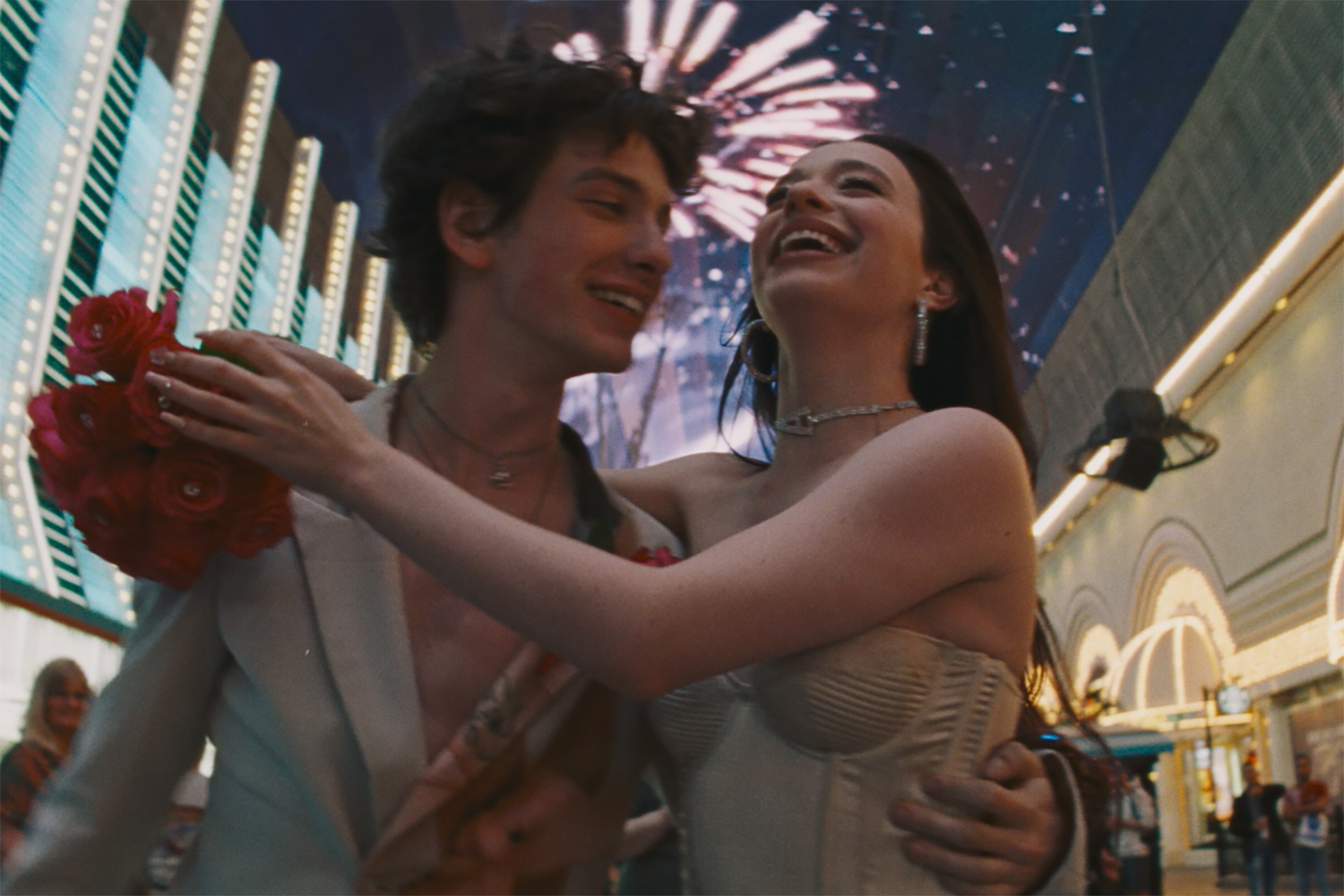
Mikey Madison as Ani in a scene from "Anora". (Photo courtesy of NEON)
Call it trickle-down cinematics. Highly anticipated awards season titles are finally coming our way after making the rounds at film festivals across the globe. The hype machine is running at full speed, and the most deafening buzz is currently revolving around two big winners at Cannes back in May.
But don't get too excited about these prestige picks, both opening this weekend in South Florida theaters, because they do not live up to the extended standing ovations and the gushing geysers of praise you may have come across on your social media platforms. These plus-sized efforts from renowned directors aim high, then proceed to belly flop in all kinds of confounding ways, to varying degrees. There's something to be said for taking chances, but these no-guts-no-glory swings miss the mark. Let's take a closer look at this pair of genre-bending busts.
“Anora”: Ani is very good at her job, and her job is ensuring her excited, nervous clients reach the desired waves of ecstasy. There she is, gyrating in slow motion, the most charismatic performer in this row of exotic dancers giving lap dances to men of different ages and all walks of life in a tucked away corner of a Manhattan strip club.

Mikey Madison as Ani and Mark Eydelshteyn as Ivan in a scene from "Anora". (Photo courtesy of NEON)
As the latest portrait of life on the margins from writer-director Sean Baker opens, we can't help but like Ani. As played by the captivating Mikey Madison, she's a tough and business-minded sex worker, but if she picks you, and you fall on her good graces, you feel as if you've made a new friend. An older generation would call her a petite firecracker. Just don't call her Anora; she prefers the abbreviated form.
Baker initially bends his story in the shape of a fairy tale, a “Pretty Woman” riff with indie street cred. Ani, who is Russian American, is rudely interrupted from her dinner break because they need a stripper who speaks that language. The 23-year-old reluctantly agrees, and comes face to face with Ivan (Mark Eydelshteyn). Lanky and boyishly handsome, Ivan sports attractively tousled dark hair that bring to mind French actor Louis Garrel, but his demeanor is strictly Gen Z party boy with moolah.
Ani immediately sees the dollar signs, in the form of $100 bills he attaches to her thong, but after Ivan, won over by her sexytime moves and broken Russian, keeps inviting Ani to his not-so-humble abode for explicitly rendered trysts, the transactional rendezvous give way to genuine feelings. An impulsive marriage proposal, as they both lie in the master bedroom of Ivan's mansion, catches Ani by surprise, but this sensible entrepreneur of the flesh throws caution to the winds for once in her life. She says “okay.”

Yura Borisov as Igor in a scene from "Anora." (Photo courtesy of NEON)
So far, so charming. The first hour of “Anora” shows Baker in skillfully calibrated portraiture mode. It helps that the “Tangerine” director is an equal-opportunity sensualist, so both of his lovebirds are the subject of the lens' gaze. Also, his ability to sneak in bits of exposition in tossed-off lines of dialogue serves him well here. We learn, for instance, that Ani's grandmother never learned English, making Ani a third-generation American. We also discover that Ivan's dad is so loaded, you can Google him, and he pops up right away.
Ah, yes, Ivan's parents. A reality check is in store for the newly engaged couple, and when it comes, Baker attempts to pull off an abrupt tonal shift, from a bawdy rom-com to a bruising spin on a screwball comedy. That's when things start heading south, for the characters and the movie.
Once word of the engagement reaches Russia (can't these young'uns stay off their apps?), a trio of problem fixers barge into Ani and Ivan's love nest, where she patiently puts up with his bong-hitting and video game fixation. The muscle? That's Garnick (Vache Tovmasyan) and hired hand Igor (Yura Borisov). The brains who hired these goons? That's Toros (Karren Karagulian), who we soon learn has been cleaning up Ivan's messes since he was a boy, as opposed to his current arrested development-afflicted version.

Vache Tovmasyan as Garnick and Yura Borisov as Igor and in a scene from "Anora". (Photo courtesy of NEON)
Wait, where did Ivan go? Survival mode kicks in, and Mamushka's panicked little angel flies the coop, leaving Ani to her own devices. What follows is a roughly half-hour long sequence that plays Ani's kidnapping for laughs. It also stops the movie dead in its tracks. The trio of bumbling heavies would have been right at home in a 1940s studio film from Ernst Lubitsch or a 1950s offering from Billy Wilder, but Baker doesn't know when to let up, hitting the same shrill note over and over again. The considerable goodwill he's amassed, nearly miraculous for this frequent Baker detractor (ask me just how much this Florida critic hates “The Florida Project”), vanishes in minutes.
“Anora” may have sashayed away with the Palme d'Or at Cannes this spring, but it goes from alluring from obnoxious at warp speed, and once the madcap search for the runaway scion gets underway, there's still about 45 minutes of screen time left. At 139 minutes, the film plays like the assembly cut for a 100-minute film. A tasty subplot involving Ani's catty clashes with fellow dancer Diamond (Lindsey Normington) is about the only thing here that doesn't feel overextended. This is Lubitsch with a sledgehammer, Wilder with no snap.

Karla Sofia Gascon as Emilia Perez in a scene from "Emilia Perez." (Photo courtesy of Page 114 Why Not Productions Pathe Films France 2 Cinema)
After what feels an eternity, Baker wraps things up with an affecting scene that attempts to drive home the class divisions that prevent driven, hardworking people like Ani to partake in the American dream. Madison handles the whiplash-inducing switch like a pro. Sadly, the pathos not only feels unearned, but like something from an altogether different movie. One that hasn't let down its headstrong go-getter.
“Emilia Pérez”: The new film from French director Jacques Audiard is only nine minutes shorter than “Anora,” but it's by far the better-paced Cannes sensation. It also boasts a cool, eclectic, multicultural cast, a globe-trotting scope with a Mexico home base, and the gumption to pepper its hard-hitting drug cartel narrative with brash musical numbers. It's the kind of unclassifiable hybrid that I like to champion.
And that's where the positives end. “Emilia Pérez's” authenticity is strictly limited to its correctly punctuated title. It's a pungent stew of good intentions and astonishingly ill-conceived creative decisions.

Zoe Saldana as Rita Moro Castro in a scene from "Emilia Perez." (Photo courtesy of Shanna Besson/Page 114 Why Not Productions Pathe Films France 2 Cinema)
But the extent of its toxicity is not immediately apparent. Its first misstep, that of perspective, can be attributed to an outdated approach to its subject matter. This is the story of a drug lord who wants to become a woman, not out of fear for his life, but because it's something he's always wanted to do. So, of course we see all this predominantly play out from the point of view of the overworked attorney who's able to move mountains in order to make this wish a reality.
Minutes after the argument she wrote, and got no credit for, got a guilty-as-sin man accused in his wife's murder acquitted, Rita Moro Castro (Zoe Saldaña) receives an ominous phone call. The raspy voice on the other end entices her with a big payday. Moments later, Rita is abducted and brought before the infamous Manitas del Monte (Karla Sofía Gascón). What follows involves meticulous research, as well as persuading a skeptical Israeli surgeon. Then comes the moment of transition, all with little curiosity about the details of such a procedure, and even more telling, preserving Manitas as the other. We're kept outside her headspace at this crucial juncture.

Selena Gomez as Jessi in a scene from "Emilia Pérez." (Photo courtesy of Shanna Besson/Pathe © 2024)
We end up knowing a lot more about Rita because Audiard (“A Prophet,” “Rust and Bone”), here adapting his opera libretto, itself loosely adapted from Boris Razon's 2018 novel “Écoute,” wants to shroud Manitas in mystery. He even shoots the character in extreme close-up, with dank, grimy lighting.
Once Manitas becomes Emilia, Audiard shifts his perspective to that of an omniscient narrator, but his transgender protagonist remains just out of reach, a chess figure in a sudsy telenovela plot with shades of Douglas Sirk and Pedro Almodóvar, brought to a roiling boil with Audiard's own sour seasonings. The filmmaker, for instance, milks Emilia's love for the two young sons she's had to abandon. How badly does she want them back in her life? Her machinations are not terribly far removed from a certain 1993 cross-dressing comedy starring Robin Williams.
“Emilia Pérez” can't quite shake a pervasive Eurotrash flavor, meaning that despite the atmospheric shots of Mexico City, it feels like Audiard is throwing on Mexico perfume hoping it's enough. (It isn't.) All this unfolds in dignified, aggressively somber and sincere fashion. Audiard also abruptly introduces Emilia's commitment to unearthing the “disappeared” drug cartel victims, then abandons the self-serving PSA almost as swiftly as he introduced it.
Then “Emilia Pérez” spins out of control and goes off the rails. How ludicrous are the hairpin story turns? Let's just say they're so unintentionally hilarious, a car blows up with impeccable comic timing.

Karla Sofia Gascon as Emilia Perez and Adriana Paz as Epifania in a scene from "Emilia Perez." (Photo courtesy of Shanna Besson/Pathe © 2024)
The stars do what they can. In addition to Saldaña and Gascón, Adriana Paz makes a strong impression as the widow of one of the disappeared. The same cannot be said for Selena Gomez, who plays Manitas' wife, Jessi, and is terrible, terrible, terrible in the part. It's bad enough that she all too neatly fits the mold of a crime lord's pampered spouse; Audiard wants viewers to buy her as a native Spanish speaker. Yeah, right, sure. Even more ludicrous, for an obscene amount of screen time, Jessi never doubts Emilia and Manitas are two different people. I have a question for Monsieur Audiard: Do you really think we're that stupid?
“Emilia Pérez” aims to lionize the titular character, portraying with crippling inelegance her journey from crime (bad) to philanthropy (noble), but that sentiment is at odds with how the movie treats her. The punishment she endures, physical and emotional, mirrors how the film jerks viewers around. It's insulting. Audiard has churned out festering garbage that thinks it's cinema of quality. Non, merci. Gracias, pero váyase al diablo. Now watch the darn thing win a truckload of awards between now and Oscar night.
“Anora” starts Friday at AMC Aventura, AMC Sunset Place and Regal Dania Pointe. It's scheduled to open at Coral Gables Art Cinema Nov. 15. “Emilia Pérez” screens Thursday, Oct. 31, at 7 p.m. at Silverspot Cinema in downtown Miami as part of Miami Film Festiva's GEMS showcase. It opens Friday at O Cinema South Beach, then makes its way to Netflix on Nov. 13.
 MAIN MENU
MAIN MENU

